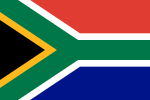Corruption in South Africa includes the improper use of public resources for private ends, including bribery and improper favouritism.[1] Corruption was at its highest during the period of state capture under the presidency of Jacob Zuma and has remained widespread, negatively "affecting criminal justice, service provision, economic opportunity, social cohesion and political integrity" in South Africa.[2]
South Africa has a robust anti-corruption framework, but laws are inadequately enforced and accountability in public sectors such as healthcare remain below par.[3] In addition, internal sanctions have been employed to discourage whistle-blowers from reporting corrupt activities in both the public and private sectors – according to a 2021 Afrobarometer survey, 76.2% of South Africans believe that ordinary people risk retaliation and other negative consequences if they report incidents of corruption.[4]
A scandal involving the Gupta family and former South African President Jacob Zuma pushed Zuma out of office as a long list of corruption complaints against the former President resurfaced.[5] Complaints against Zuma range from the former leader's lavish spending of state funds, to delegating contracts based on nepotism and businesses with familial connections or close ties benefiting through their association with him.[6] The Zondo Commission was later created to investigate Zuma and his associates for corruption. On November 11, 2020, it was revealed that a historic anti-corruption blitz resulted in the arrest of more than 100 South African political, education, health, police and business officials on corruption charges.[7]
Corruption has also negatively impacted South Africa's ability to resolve the country's long running energy crisis.[8][9][10] Despite efforts to reduce corruption, it remains a significant problem facing the country with a 2024 Aafrobarometer survey showing that it has significantly contributed to a large drop in public support for democracy whilst hindering efforts to reduce poverty, unemployment, and inequality.[11][12]
- ^ Lodge, Tom (31 December 2011). "Political Corruption in South Africa". Political Corruption. ISBN 9781412813891.
- ^ "Strategic Organized Crime Risk Assessment" (PDF). Global Initiative Against Transnational Organized Crime. Global Initiative Against Transnational Organized Crime. September 2022. pp. 7, 21, 22, 29–30, 110, 112. Retrieved 15 April 2023. p. 7:
Corruption peaked during the state capture period under President Jacob Zuma but remains widespread and deeply corrosive, affecting criminal justice, service provision, economic opportunity, social cohesion and political integrity.
- ^ "Business Corruption in South Africa". Business Anti-Corruption Portal.
- ^ "Summary of results: Afrobarometer Round 8 survey in South Africa in 2021". Afrobarometer. 2021. Archived from the original on 13 December 2021. Retrieved 13 December 2021.
- ^ "The delicate dance to depose Jacob Zuma". The Economist.
- ^ "Long waltz to Freedom: South Africa Politics". The Economist. Retrieved 1 March 2018.
- ^ "More than 100 people have now been arrested in SA's recent corruption blitz – here's the list". Business Insider South Africa. 11 November 2020. Retrieved 23 December 2020.
- ^ Staff Writer. "How the ANC government broke Eskom – 2008 versus 2018". Retrieved 27 October 2021.
- ^ Grootes, Stephen (3 June 2021). "ANALYSIS: Thirteen wasted years later, our electricity network is crumbling – and South Africa with it". Daily Maverick. Retrieved 27 October 2021.
- ^ "Problems at Eskom Identified as a Main Cause of SA's Energy Crisis". College of Agriculture, Engineering and Science. Retrieved 27 October 2021.
- ^ "Corruption crushing South Africa's core". BusinessTech. 29 July 2024. Retrieved 9 August 2024.
- ^ "African insights 2024: Democracy at risk – the people's perspective" (PDF). Afrobarometer. 2024. Retrieved 9 August 2024.

